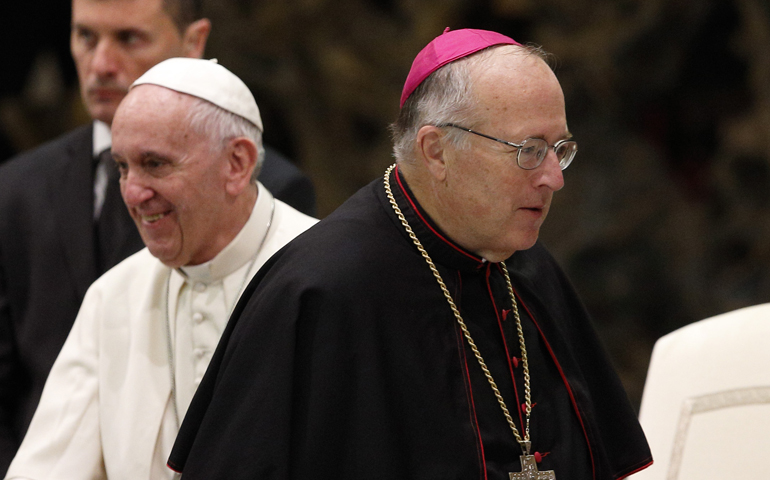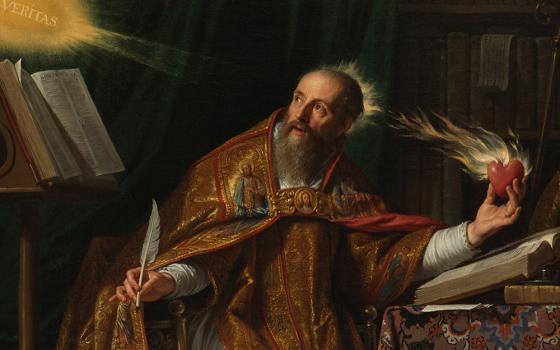
Editor's note: This talk, titled "Three Kinds of Erroneous Autonomy," was delivered Jan. 10 at the symposium "Erroneous Autonomy: The Dignity of Work" organized by the Institute for Policy Research and Catholic Studies at The Catholic University of America, Washington D.C.
It is a great pleasure to participate in this third colloquium on the theme of erroneous autonomy. In 2014 the conference speakers examined the history, tenets and implications of libertarianism as a system of thought and social organization, pointing to the reality that the individualism which is foundational to libertarian thought is itself a form of erroneous autonomy that is incompatible with Catholic social teaching about the nature of the human person, the foundations of economic justice and the establishment of a just society.
Last year the conference focused on the realization of solidarity in society as the alternative pathway to the various forms of erroneous autonomy which flourish under different labels in American society but are linked by a radical individualism. Solidarity, in the words of the compendium of Catholic social teaching, "highlights in a particular way the intrinsic social nature of the human person, the equality of all in dignity and rights and the common path of individuals and peoples toward an ever more committed unity." Solidarity is a principle of Catholic social teaching which was crystalized by Pope John Paul II, and it is important to note the radical degree to which the principle of solidarity evolved from the crucible of alliance between workers associations and the church in Poland in resisting government and economic oppression. In the 2015 conference the erroneous nature of hyper-individualism in American thought and society was contrasted with the much richer organizing principle of solidarity that leads to a fuller dimension of human flourishing, both domestically and globally.
My remarks today seek to point to a third notion of erroneous autonomy in American society and culture. Catholic social teaching is an integrated reflection on the implications of the gift of God's creation to all humanity and the Gospel of Jesus Christ. It is framed explicitly within the context of faith, yet advances a vision of the human person, the nature of society and the glories of the universe which seeks to bridge differences of religious perspective. Catholic social teaching is rooted in four enduring moral principles: the dignity of the human person, the pursuit of the common good, the principle of subsidiarity, and the call of solidarity. The church's doctrine is founded upon ancient insights into the nature of the human person, but is also renewed and expanded in every age to integrate new moral realities that processes such as industrialization, secularization, globalization and environmental deterioration have produced. Central to the vision of Catholic faith is the conviction that the framing concepts in society and government must always be moral in nature and must serve to promote the deepest levels of justice and freedom in society.
At this moment in American social and political life, three potent framing forces are at work which have no moral identity and are becoming directive in our national life. The first of these is the drive for the sovereignty of markets. The second is the technocratic paradigm which seeks dominance over the environment and culture. The third, and most worrying, is nationalism. None of these currents in our national life are rooted in a philosophical or theological system. None has any deep-seated sense of moral substance. In a very real way they have been evacuated of moral substance and operate autonomously from any moral anchors as principles of politics and governance in our national life. This is the most dangerous form of erroneous autonomy which we face in the United States today. It is this notion of erroneous autonomy which has been at the heart of Pope Francis' prophetic condemnation of each of these impulses in the modern world, for he correctly sees that these forces are purely instrumental in nature and yet claim moral legitimacy and autonomy in reshaping society.
The Sovereignty of Markets
We are poised to witness in the United States a return to public policy which moves aggressively to establish market mechanisms within ever more expansive realms of national life. It will begin with eliminating the restrictions which have been placed upon markets after the Great Recession to guard against a recurrence of the plundering of the American economy by market-based manipulations. Then it will move to repealing policies which have been enacted to safeguard the environment and public health and safety. Even now, "free market solutions" for our national programs that provide vital income and health care for the elderly and the marginalized are gaining increasing traction because they de-link these safety nets from the anchor of existing benefit levels and through market mechanisms over time will decrease costs and, of course, decrease the substance of the benefits. Finally, the swing of the free market pendulum is accompanied by a coordinated effort to roll back wage and benefit structures for workers, as well as health and safety standards and the critically important rights of workers to organize and bargain collectively.
It is vital to recognize that free markets have a vital role to play in the creation of wealth, the generation of jobs, and the advancement of human dignity. One of the great additions to Catholic social teaching in the last half century was the increased appreciation for market mechanisms as a source of good in the world economy.
But as Catholic social teaching has made clear in every moment of the modern era, free markets do not constitute a first principle of economic justice. Their moral worth is only instrumental in nature and must be structured by society and government to accomplish the common good. In Centesimus Annus, the very encyclical in which John Paul II integrated into Catholic social teaching an enhanced evaluation of the power of markets for good, he made absolutely clear that any market system must be "circumscribed within a strong juridical framework which places it at the service of human freedom in its totality, and which sees it as a particular aspect of that freedom, the core of which is ethical and religious." The sustained conviction of Catholic doctrine is that the dignity of the human person is the mean and the measure of every system and institution, and that markets must be structured to reflect that perspective.
Pope Francis has confronted unequivocally the movement which ignores the instrumental nature of free markets and instead claims for markets ever greater autonomy from the criterion of the common good. He has condemned this movement as the sacralization of markets, a sacralization which posits a normative presumption that markets automatically function for the benefit of society, when in many instances they erode the very foundations of human freedom, justice and dignity.
The church must work in the coming months with unions, workers, the elderly and the poor to counter the growing imperialism of market mechanisms within American public life. This means making clear both the capacity of free markets to enhance life in the United States and the instrumental nature of markets which must always be placed within a public policy framework anchored in justice. In addition, this coalition must witness powerfully to the unacceptability of linking vital public benefits to market mechanisms that will inevitably diminish support for the neediest members of our nation while exempting the wealthy and the powerful from the call to sacrifice. It cannot be said too strongly that using market mechanisms for the establishment of benefit levels in American society for our most vulnerable populations will unleash a series of silent killers in our nation that are all the more invidious because they are aimed at those without power.
Finally, the church must form deeper ties with labor to prevent the imperialism of markets from further crippling the right to organize and bargain collectively in coming years. One of the lynchpins of the tradition of Catholic teaching on economic justice is that the right to workers' associations is not only an essential element of obtaining justice for the workers themselves, but that it also contributes to the common good of society as a whole. There is no doubt that there will be further attacks upon the rights of public sector unions to exist and seek justice for their members in the coming years. And while the duty of all unions to seek the common good of society as a whole presents special obligations for public workers, all of the fundamental principles of Catholic social teaching which have enshrined the right to organize and bargain collectively at the very heart of the church's social doctrine testify equally to the right of public sector workers to obtain justice in pay, benefits and working conditions through robust unions.
The imperialism of market mechanisms at this stage of our nation's history is a compelling example of erroneous autonomy. Our culture presents free markets as morally uplifting for society. In fact, market mechanisms are morally neutral. They are ethically beneficial when they serve the common good in society by their creation of wealth, the enhancement of freedom and their service to distributive justice. They are morally destructive when they are advanced without a juridical framework in society which insures that markets ultimately serve all. And they are especially destructive when they become surrogates for political choices which diminish support for the elderly, the poor and the marginalized, or when they undermine the rights of workers.
While it is clear that the imperialism of markets will grow in questions of domestic economic life and public policy, it is not clear that this same expansion of free market thinking will mark the American position on international trade. This is not because the power of free market assumptions is not robust. Nor does it result from a desire to achieve elements of international justice which might be harmed by free market approaches. Rather, it springs from the president-elect's view that the decline in manufacturing in the United States can largely be attributed to existing international agreements created by the United States. It is important to note that this conflict between President-elect Trump and the Congressional wing of the Republican Party is expressed not as a direct attack on free markets, but as an assertion that the United States has suffered for the past twenty years because international agreements forged by the American government did not really reflect fair free trade, but rather inept government decisions. Hence even when free markets fail, it is not their fault.
The Technocratic Paradigm
One of the most penetrating themes of Pope Francis' encyclical Laudato Si' critiques the manner in which the technocratic paradigm has taken hold in the modern world as a form of mastery over the earth which claims to make infinite progress possible for humanity. "This paradigm," Francis writes, "exalts the concept of a subject who, using logical and rational procedures, progressively approaches and gains control over an external object." This control is achieved using scientific concepts and an engineering perspective, which inevitably bring with them a sense of possession, mastery and transformation.
Pope Francis asserts that the central myopia of the technocratic paradigm springs from the fact that it reduces complex realities of the human person and the universe to the plane of instrumentalization and scientific abstraction. "Technology tends to absorb everything into its ironclad logic, and those who are surrounded with technology "'know full well that it moves forward in the final analysis neither for profit nor for the well-being of the human race, that 'in the most radical sense of the term power is its motive – a lordship over all."
Related: "Pope Francis: Technology + greed = disaster" (Aug. 13, 2015)
The most important external object which the technocratic paradigm threatens is the earth itself. Even as ever more compelling signs of the deterioration of our planet emerge, the ethic of mastery denies that this deterioration is real, and proposes that if the earth does deteriorate technology will produce a solution. The technocratic paradigm is an especially strong current in American culture because it resonates with the American tendency to believe that there are no limits to human achievement and the assumption that enlightened engineering provides the soundest pathway for human progress.
The technocratic paradigm is a devastatingly corrosive form of erroneous autonomy. It claims moral status through its ability to capture one element of reality and promises that this one element has the capacity to produce human flourishing. Yet the exhaustibility of the earth's resources, the rapaciousness of human appetites unleashed in the ever expanding competition for material goods and the bankruptcy of a notion of human flourishing reduced to any one dimension of our existence all testify to the emptiness of that promise.
Laudato Si' is the fire bell warning the world that it must reject the technocratic paradigm and treat the earth as our home, a sacred gift bestowed upon us by our Creator as a grace destined to benefit all of humanity and every generation. Pope Francis testifies to the reality that we are called to be the stewards and servants of creation, rather than its masters. We are called to have an awe for the environment in all of its magnificence, vitality and fragility. Policy decisions must proceed from this sense of awe and stewardship, and technological perspectives must be seen as mere instruments of a much richer order of justice.
While the devastating effects of the technocratic paradigm are most evident in the assault upon the earth which is our common home, the application of the technocratic perspective to culture has also proven injurious in the present day. Catholic theology teaches that culture is a spiritual and ethical enterprise, richly interwoven with the lives and heritage of a people. While every culture must be subjected to the demands for renewal and reform based upon the deepest ethical exigencies of the human person, the technocratic perspective in the international system has frequently resulted in attacks upon cultures which demean them and victimize their societies. Pope Francis has stated that these interventions often have the mark of neo-colonialism, in their imposition of the values of the dominant international culture upon economically challenged societies.
Even within our own nation, the painful cleft in our culture has been magnified by the effects of the technocratic perspective on public policy. Various interventions by the Obama administration designed to recast American society and culture in light of a reductionist egalitarian template have infringed upon the legitimate autonomy of religious communities, cultural traditions and familial patterns. The legal redefinition of charitable, healing and educational ministries operated by faith communities in a manner designed to provide an ongoing interventionist pathway for government to nullify important teachings of faith across a broad spectrum is one example of the technocratic perspective at work. The heavy-handed manner in which the administration addressed the extremely complex issue of transgender rights is another. Such interventions account in no small part for the feelings of alienation which many citizens have from elite leaders in our nation today, since these actions proceeded from a profound failure to treat respectfully deep elements of our national culture.
Nationalism
Make America great again! These words point to the feelings of dispossession which have been abroad in our nation. They hint of past betrayal. They call forth noble sentiments of true patriotism rooted in the glorious legacy of the American people. They also signal a nostalgia for a more homogenous nation.
The merger of populism and nationalism at work in the cultural and political currents of the United States has given new power to the nationalist impulse.
In Catholic social teaching the love of country is a virtue. The Compendium of the Social Doctrine of the Church states that "the principle of solidarity requires that men and women of our day cultivate a greater awareness that they are debtors of the society of which they have become a part." And in his moving message to the people of Poland entitled "My Beloved Countrymen", Pope John Paul II spoke of true patriotism amidst the cauldron of oppression and upheaval: "Love of our motherland unites us and must unite us above all the differences. It has nothing in common with narrow nationalism or chauvinism. It is the right of the human heart. It is the measure of human nobility."
But if love of country is a virtue and a moral obligation in solidarity, the nationalistic impulse itself has no moral identity. It can signal the most virtuous patriotism which integrates the love of country into the spectrum of moral obligations that accrue to our humanity or it can be rooted in pride, isolationism and discrimination. As a consequence nationalism as a directive force in society is an example of erroneous autonomy; it is a moral good only when it is connected and subordinated to the order of justice and freedom. It is immoral when it functions autonomously from that justice and freedom.
There are three questions which the United States must wrestle with in the coming months, in order to insure that the nationalist impulse coursing through our society evolves into a true patriotism which is morally sound and unitive for our country.
The first of these questions is: who are "the people" in the United States? Populist movements in American history have raised important and substantial claims of injustice against oppression by elites in economic, political, juridical and cultural life. But populism has also often carried with it claims that "the people" are really only some of the people who live within the United States. For this reason, populist nationalism has often been exclusionary and nativist. The recent campaign was deeply marred by exclusionary rhetoric and proposals that have driven deep wedges into our culture and raised the specter of imposing exclusionary government policies. It is essential that the nationalistic impulse be purged of this nativist dimension so that it can be a source of unity in our nation rather than division.
The second question which America must confront is: what does greatness mean for the United States? Does this greatness revolve principally around questions of power, wealth and success? Or is the greatness we seek founded in the order of justice, freedom, truth and solidarity? In short, is it a material greatness or a greatness of the soul?
The question of American exceptionalism has long been a source of contention in historical and political debate. And this exceptionalism has been characterized in many different ways. In my view the most important form of exceptionalism which we might claim flows from the reality that we as a nation of immigrants are not tied together by connections of blood, but rather by the set of aspirations which our Founders set forth in 1776 and which they both succeeded and failed to attain. Thus patriotism for us as Americans is an aspiration renewed in every age by understanding the noble elements of our nation's birth and the defects of its original vision. And our patriotism is not a foundation for pride, but an ever deepening challenge to ennoble our culture, society and government. Such is the nature of true greatness for America.
The final question which our society must answer in relation to the nationalism coursing through our culture is whether that nationalism conceives itself as rooted in the interests of the United States alone, or whether it is connected on a fundamental level with our obligations to the international common good. In surveying the effects of globalization on the world, Pope Benedict lamented "as society becomes ever more globalized, it makes us neighbors but does not make us brothers." Does the nationalism which we are experiencing today view our country as brother and sister to the other peoples of the world? Catholic social teaching has become ever clearer that on issues of international trade, the environment, human trafficking, refugees and migrants, and war and peace there is an international common good which must constrain powerful nations from using their asymmetrical power to disadvantage the most vulnerable peoples of the world. Moreover, the dominant nations of the world have a special obligation to use their strength to create collective goods for the world as a whole. Only a nationalism attentive to such a notion of the international common good is truly capable of bringing greatness to America.
The Challenge of Erroneous Autonomy
The past year compels us to pay greater attention to deep cultural and political currents which rage within our nation, rather than to carefully thought out ideologies and political programs. It has also alerted us to central cultural forces which claim moral legitimacy, but which are in themselves morally neutral or even devastatingly destructive when disconnected from a moral and political framework tied to the order of justice, freedom and solidarity.
It is not in their internal structures that the drive for free markets, the technocratic perspective or nationalism are dangerous. It is when they are morally autonomous, when they in themselves are directive of cultural thinking and public policy, that they become perilous for the well-being of our nation.
It is our task as a people to reconnect these cultural currents to sound moral anchors. It is a task of dialogue and solidarity, honesty and openness. And ultimately it is a task of grace and hope.
[Robert McElroy is bishop of the San Diego, Calif., diocese.]



